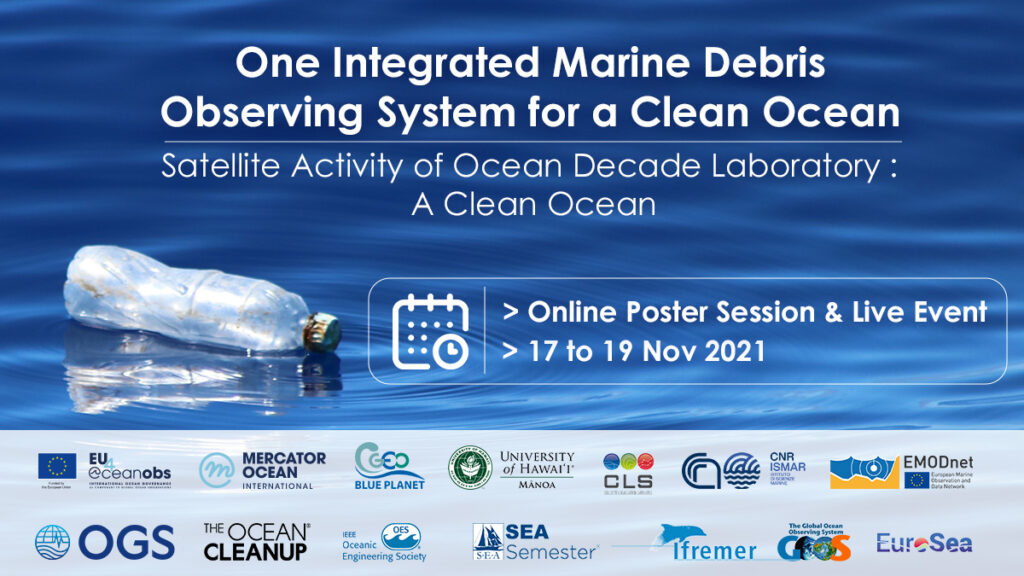An official satellite activity of the UN Ocean Decade “a Clean Ocean” Laboratory
This event is organised by a consortium of 14 international ocean experts and is hosted by GEO Blue Planet and Mercator Ocean International as an official satellite activity of the 3rd UN Ocean Decade Laboratory “a Clean Ocean”.
We will discuss the current state of the marine debris system, our knowledge about it and ways forward for implementing the Integrated Marine Debris Observing System (IMDOS). We aim to learn about recent advancements in observational techniques and technologies as well as to enhance cooperation, bringing together multidisciplinary approaches from diverse communities of stakeholders.
The hybrid event will include:
- Three plenary sessions, available in both English and French with invited talks, live discussions and interactions between participants and panellists via Zoom.
- Plenary Session 1: Strengthening scientific knowledge – Nov. 17, 2021, 8-10pm CET
- Plenary Session 2: Fostering new monitoring capacities – Nov. 18, 2021, 10-12am CET
- Plenary Session 3: Defining the future of IMDOS – Nov. 19, 2021, 9-11am CET
- An online virtual poster hall on the MIRO platform where presenters and participants will be able to connect and interact, available online from 10 to 30 November 2021
To learn more about the event and register for plenary sessions and updates please visit the dedicated web page, by clicking here.
Submit poster & participate in virtual poster hall
To submit a poster, please send ashort plain language abstract (max 100 words) to audrey.hasson@geoblueplanet.org before 22 October 2021.
We address our call to all experts to participate in the poster hall including, but not limited to, academics, professional and citizen scientists, engineers, activists, indigenous communities organisations, private companies and intergovernmental organisations.
If selected, participants have the choice to submit a poster (1 X 1 square) and/or a 2-to-5-minute video recording presentation of their poster by 5 November. You can already have a look at the template MIRO board that will host the poster hall, available here: https://miro.com/app/board/o9J_luGx3BM=/
The Poster Hall will be open from 10 to 30 November 2021 and will consist of posters and video presentations in 4 different sessions:
Trans-disciplinary Approaches Session
Recent studies reveal new impacts that anthropogenic marine debris poses on marine ecosystems and on human society. This includes but is not limited to transport of invasive biological species, supply of nutrients to the oligotrophic ocean, release of greenhouse gases by degrading plastic, and losses in the fishing and tourism industries. Addressing the mitigation of marine debris requires transdisciplinary approaches bringing all stakeholders to the table.This session invites posters on innovative transdisciplinary efforts to understand and tackle the marine debris problem at different levels.
Monitoring Technologies and Modelling Session
There is a need for regular and standardized monitoring of marine litter in order to understand long-term changes in marine litter pollution and for the successful development and implementation of mitigation strategies. This session will show-case a wide range of in situ and remote sensing methods, technologies and associated best practices for observation, quantification and characterization of the diverse nature, sources, fate, and impacts of marine debris. Experts are also invited to share state-of-the modelling methods used to complement marine debris monitoring and scientific assessments.
Networks Session
Marine litter monitoring is supported by many communities of practice and emerging observing networks which are gathered locally as well as globally around specific indicators, common observing or modelling technologies, citizen initiatives, or indigenous traditions. This session seeks the creation of synergies amongst these networks and communities of practice which want to share their experience in fostering cooperation within and outside their communities for the benefit of building an Integrated Marine Debris Observing System.
Digital Ecosystems Session
The wealth of existing data, information and knowledge on marine litter and debris is distributed in a complex web of databases, portals and aggregating platforms. A robust and collaborative digital ecosystem which integrates various distributed data management frameworks and resources is key to offer access to relevant products to a wide range of stakeholder communities including scientists and policy makers. This session invites posters on specific databases or data products but also coordinated actions delivering information to stakeholders addressing the challenges of marine litter pollution monitoring and mitigation. Posters presenting transformative approaches to a digital ecosystem for marine debris are particularly welcome.

